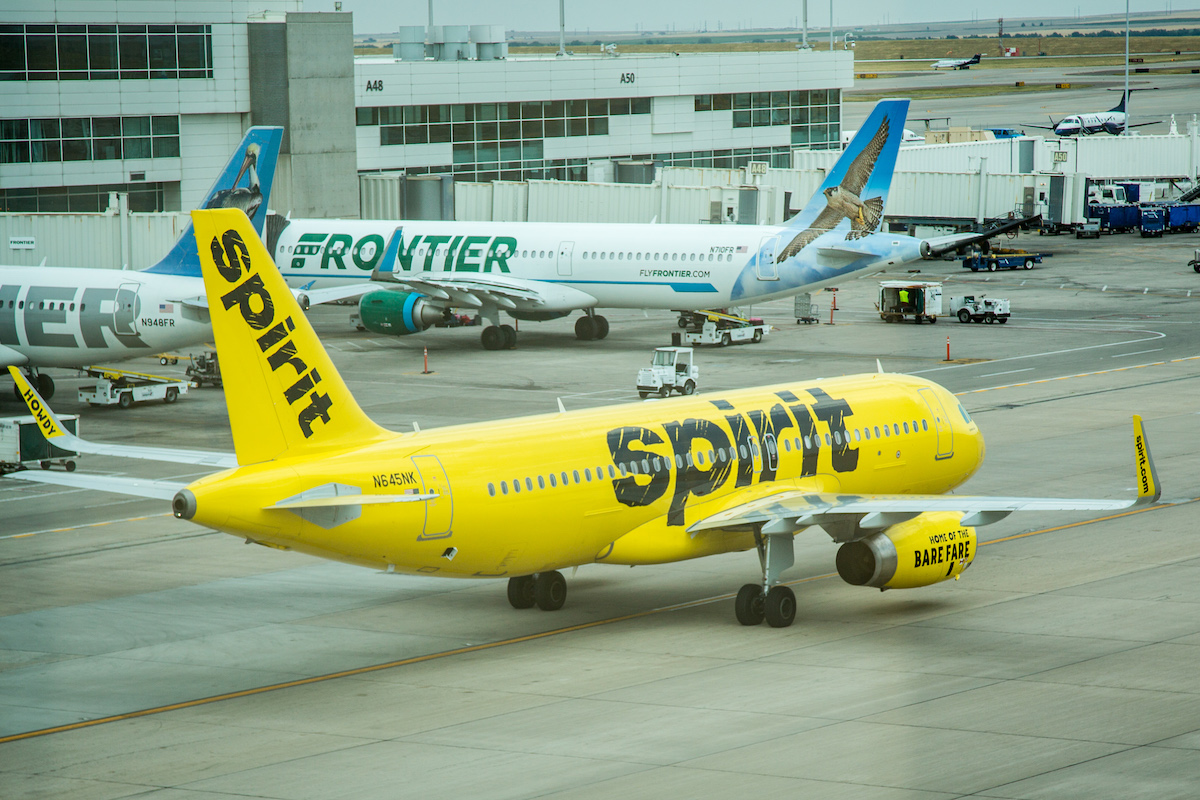Frontier Airlines to Buy Spirit in $6.6 Billion Cash-Stock Deal

Skift Take
Frontier Airlines and Spirit Airlines have unveiled plans to merge in a deal that would create the fifth largest carrier in the U.S. and a budget juggernaut to be reckoned with.
Under terms unveiled on Monday, the cash and stock deal would create an airline serving more than 145 destinations in 19 countries with more than 280 aircraft. Frontier — the dominant partner in the deal — shareholders would own 51.5 percent of the resulting company despite Spirit being the larger airline. The merger has been approved by the boards of both carriers, but is subject to the approval of a Biden administration increasingly wary of consolidation. The airlines hope to close the transaction in the second half of 2022.
The transaction is valued at $6.6 billion, including the $2.9 billion equity value of Spirit as well as net debt and operating lease liabilities. Spirit shareholders would receive 1.9126 shares of Frontier plus $2.13 in cash for each of their shares.
There have long been rumors of a possible Spirit-Frontier combo. The two budget airlines — known as "ultra low-cost carriers" in the industry — both come from the Indigo Partners flock; a private equity firm known for creating a certain breed of successful discounters. Indigo built Spirit into the airline it is today before selling the company in 2013 when it acquired Frontier, which itself went public in 2021. Both airlines fly complementary Airbus A320 family jets and seek to stimulate leisure travel with cheap, point-to-point flights.
The combined carrier would be the fifth largest in the U.S., catapulting the airlines ahead of Alaska Airlines and JetBlue Airways. Spirit-Frontier would have a 6.5 percent share of U.S. passengers based on 2019 numbers, according to U.S. Bureau of Transportation Statistics (BTS) data. Their share grew to 8.3 percent of the market during the first 10 months of 2021, the latest BTS data show. The airline would remain behind American Airlines, Delta Air Lines, Southwest Airlines, and United Airlines that control more than three-quarters of the U.S. market.
“This transaction is centered around creating an aggressive ultra-low fare competitor to serve our guests ... and increase competitive pressure, resulting in more consumer-friendly fares for the flying public,” said Spirit CEO Ted Christie in a statement.
Antitrust Hurdles
Both Frontier and Spirit have recovered faster from the coronavirus pandemic than many of their competitors owing to the strength of leisure traffic. The airlines reported $117 million and $473 million net losses, respectively, in 2021 on Monday. However, in the fourth quarter Spirit posted revenues 1.8 percent higher than in 2019 at $988 million; Frontier revenues were down 7 percent year-over-two-years to $609 million. Frontier lost $53 million and Spirit $62 million during the final three months of the year.
The airlines' combined passenger traffic numbers was down just 2 percent in the final quarter of 2021. And their combined capacity was up 7 percent year-over-two-years.
Frontier and Spirit's rapid recoveries from the pandemic are likely to raise eyebrows at the U.S. Justice Department (DOJ) when it reviews the proposed merger. The regulator, along with the Federal Trade Commission, has taken a firmer line against mergers that could hurt consumers since the Biden administration took office just over a year ago. Speaking in January, the president spoke out against monopolies in key industries and said "capitalism without competition is not capitalism, it’s exploitation." A Spirit-Frontier merger, while creating a stronger budget airline, would also eliminate one competitor from the already highly-consolidated U.S. airline market.
"This is not about reducing competition and raising fares, this is about getting more low-fares to more people in more places," Frontier CEO Barry Biffle said during an investor call Monday. "We’re excited to tell our story to [regulators] and we think it will be well received."
Frontier and Spirit executives repeatedly touted the merger's consumer benefits during the call. They forecast $1 billion in annual consumer savings from the additional flight options and strong competitive position of the resulting airline in the marketplace. And Biffle said the merged carrier could serve more smaller cities with limited or no budget competition today, including Eugene, Ore., Ithaca, N.Y., and Worcester, Mass.
However, Biffle also acknowledged that the airlines will need DOJ approval for their merger. The regulator, in a recent signal of its pro-competition stance, challenged a partnership between American and JetBlue in court in September.
Jonathan Kanter, who leads the antitrust division at the Justice Department, has taken a firm stance against mergers that could reduce competition. He said in January that the department would "seek a simple injunction to block" a transaction the regulator deems would "lessen competition."
"Normally, we would not expect any regulatory hurdles given the relatively small market share of each airline, but given the Biden Administration’s 'big is bad' approach we would expect some objection," wrote Raymond James airlines analyst Savanthi Syth on Monday.
Details TBD
Frontier and Spirit still have many details to work out in their proposed merger. Not least is who will lead the resulting airline, despite Frontier's dominant position in the transaction.
William Franke, the chair of Frontier's board and managing partner at Indigo Partners, will lead a committee to determine the resulting airline's leadership, as well as its name and where it will be headquartered. Speaking Monday, Franke said the committee would undergo a "thoughtful [and] careful" analysis to determining these items, and unveil their decisions closer to the transaction's close date.
“They’re both exceptionally good CEOs," Franke said referring to Frontier CEO Biffle and Spirit CEO Christie. "It’s not an easy process but we’ll go through it.”
Frontier is based in Denver with a brand that is rooted in the former Frontier Airlines that served the Rocky Mountain region from 1950 until 1986. Spirit is based in South Florida with roots in the Midwest and Eastern U.S.
Executives of both airlines promised that the merger would not result in any job losses. They promised 10,000 new "direct" jobs — or ones at the new carrier rather than a contractor — if approved.
Sara Nelson, president of the Association of Flight Attendants-CWA union that represents cabin crew members at both Frontier and Spirit, said in a tweet Monday that their focus would be "on a review to determine whether we support this merger based on making sure it would benefit flight attendants."
Labor unions were notified of the proposed transaction on Monday as well, said Christie.
“Once you see what it does for both sides it becomes obvious: This is a very complementary transaction," he said.
This story was updated with comments from management, as well as from equity analysts.




